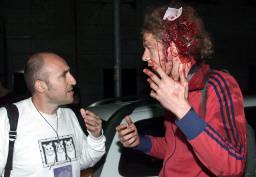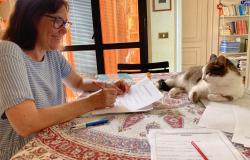Controversy raged in Italy Friday after a sentence in a trial for police brutality at the Group of Eight summit in Genoa in 2001.
The verdict acquitted 16 defendants including the three top officers and sentenced 13 lower-ranked officers to terms ranging from one month to four years - terms they will never serve because of an intervening amnesty.
The officers convicted for a raid on a school used as sleeping quarters by protesters were judged to have acted on their own without instructions from their superiors.
Three people were left comatose and 26 had to be taken to hospital in an incident that gained headlines worldwide.
The planting of fake molotov cocktails to try to justify the raid was an idea hatched up by two officers acting alone, the court found.
A spokesman for the Genoa Social reform, one of the main groups of anti-capitalism protesters at the summit, called the verdict ''a disgrace, not worthy of a democratic state''.
''The idea that these uniformed thugs - who the whole world saw storm into the Diaz school, bludgeon harmless people, fabricate evidence and tell bare-faced lies in court - were acting on their own initiative, is unbelievable''.
A hardline anti-globalisation leader, Francesco Caruso, called the sentence ''ignoble and hypocritical'' and added ''even the small fry will soon get out of jail because of the statute of limitations''.
He said that ''despite the clear evidence, none of the officers responsible were removed or suspended, but they were all promoted''.
The leader of Communist Refoundation, Paolo Ferrero, said ''this is one of the darkest and most shameful pages in the history of the Republic'' while ex-leader Franco Giordano said: ''We now know that organising brutal beatings and leaving false evidence to justify the assaults, like in a South American dictatorship, is considered a legal act''.
Giordano said the sentence would raise distrust in the state and justice, especially among young people.
Ermete Realacci of the centre-left Democratic Party said the verdict left ''an open wound'' that would only be healed when ''the complete truth is established''.
But Roberto Cassinelli of Premier Silvio Berlusconi's People of Freedom Party (PdL) said the verdict showed the magistrates had ''stuck to the facts'' and had rejected the idea of a ''plot'' by superior officers aimed at discrediting the anti-capitalist movement.
''The police force and its commanders have had their dignity restored, a dignity they deserve in their difficult task at the service of all citizens,'' said Cassinelli, who is a member of the House Justice Committee.
On Thursday evening, soon after the verdict, Defence Minister Ignazio La Russa praised the judges for refuting the ''plot theory'' and added that the 13 officers who had been convicted might have been ''treated ungenerously''.
Another rightwing member of the PdL, Maurizio Gasparri, hailed the verdict as ending ''a violent campaign against the police''.
Other parties including the Greens and surprisingly, the extreme right Forza Nuova (New Force) slammed the sentencing.
Human rights movements and relatives of the victims have also expressed dismay at the court's findings, which come four months after a similar verdict in the trial of 45 officials for brutality at a military barracks protesters were taken to.
Thirty of the defendants in that trial were acquitted.
In the Diaz trial, 29 police officers were accused of charges ranging from grievous bodily harm to planting evidence and wrongful arrest.
The police who burst into the Diaz school in riot gear arrested 93 protesters, including British, French, German and other non-Italian nationals.
Prosecutors south sentences starting from three months' imprisonment, with longer terms for higher ranking officials.
The heaviest sentence - five years - was sought for deputy superintendent Pietro Troiani, who was accused of planting two Molotov cocktails at the school.
For the two highest-ranking officers, Francesco Gratteri and Giovanni Luperi, magistrates asked for four years and six months for charges of falsification and illegal arrest.
All three were among the 16 acquitted.
The police maintained that protesters in the school were harbouring dangerous weapons and resisting arrest and that they were forced to defend themselves.
An English freelance journalist beaten by police in front of the school said the sentencing requests ''would have been much heavier in England''.
Mark Covell was unconscious for 14 hours after the raid, which left him with a vein twisted around his spine, a perforated lung, broken fingers, ten smashed teeth and eight broken ribs.
THREE TRIALS FROM G8 VIOLENCE.
More than 300,000 demonstrators converged on Genoa for the G8 summit in July 2001.
During two days of mayhem, one protestor was shot dead while attacking a Carabinieri policeman, shops and businesses were ransacked and hundreds of people injured in clashes between police and demonstrators.
The Diaz proceedings were one of three major trials to emerge from violence at the event.
In July the long-awaited verdict on brutality at the Bolzaneto detention centre drew similar protests from leftwing MPs and victims after the 30 acquittals.
As in the Diaz case, none of the 15 Bolzaneto defendants convicted and sentenced to up to five years in prison will serve time because of the statute of limitations.
In total, 252 demonstrators had said they were spat at, verbally and physically humiliated or threatened with rape while being held at the centre.
In December last year, another court convicted 24 Italian anti-global protestors for their involvement in rioting at the summit.
This was the only trial against demonstrators in connection with the event. Although police arrested dozens of people at the time, all other proceedings collapsed for lack of evidence of were dismissed by judges during preliminary hearings.




